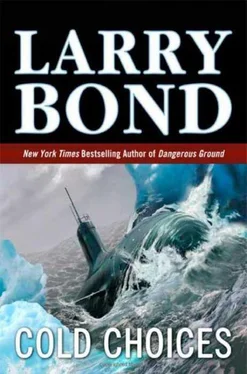Legkiy’s captain was tall, with short blond hair under his oversized white uniform cap. Particles of ice were collecting on his cap and greatcoat. He stood stiffly, nervously at attention. What was his age? Mid-thirties? Obviously he was capable. Vidchenko knew that with so few ships in commission, the Navy had its pick of men for each commanding officer’s position. Unfortunately, imagination didn’t seem to be one of the selection board’s priorities.
As Vidchenko stepped onto the deck, the captain called his crew to attention and he saluted, along with the other officers arranged behind him. Vidchenko went through the motions as quickly as he could, suppressing his irritation.
“Captain Second Rank Yuri Alexandrovich Smirnov reports Legkiy is ready! Will you inspect the ship, sir?”
“No, Captain, you may dismiss the crew.”
“Thank you, sir.” Firing a crisp salute, the captain spun in place and called “Dismiss by battle departments! Continue ship’s routine!”
The junior officers disappeared, but the senior ones remained, and the captain invited Vidchenko below. “We have some refreshments in the wardroom, sir. The. ”
“No thank you, Captain, this is not a social visit.” Vidchenko glanced back at the other officers, waiting and listening. “Let’s speak in your cabin.”
“Yes, sir, of course.” Smirnov seemed puzzled, and a little disappointed. “This way.” Dismissing the waiting officers, he led the admiral forward along the main deck port side, then into an interior passageway and up one set of stairs.
As they walked along the port side, Vidchenko looked at everything. Legkiy was an escort frigate, designed to fight submarines with her medium frequency sonar and 85RU Metel missiles. She also carried short-range antiaircraft missiles and guns for self-defense. While one of the older ships in the fleet, commissioned in 1977, she had undergone an overhaul and modernization in the late 1980s and was still rated as a capable, combat-ready unit.
She looked a little shabby. Rust showed through the paint on corners, and he could see improvised repairs in several places, work that should have been done during a refit. But funds were scarce and the Project 1135 class ships that Legkiy belonged to were being retired. There were only three left in the Northern Fleet and the other two were hors de combat. There was barely enough money for fuel and pay, so spare parts got less and paint was an afterthought. The lines and gear, the admiral saw, were properly stowed. Legkiy was a neat ship, if a little worn.
Inside, in Smirnov’s stateroom, Vidchenko could still hear the wind-driven sleet striking the ship’s sides. A family portrait on his desk and several scribbled drawings taped to the bulkhead were the only personal touches.
Vidchenko spoke as soon as the door closed. “Captain, that ceremonial welcome was a waste of my time and your crew’s.” While he spoke softly, the admiral’s tone and expression matched his words.
Smirnov protested, “Protocol demands we render proper honors, Admiral, we. ”
“We are preparing for a search and rescue mission, Captain. I don’t want anything as trivial as manning the rails to delay your preparations.” Vidchenko reached into his briefcase. “Which is why I’m here.”
He showed Legkiy’s captain a stack of messages. “This first one was received at 0700 October sixth, yesterday, reporting that you were ready for sea.” He handed it to Smirnov, who read it and nodded.
“Yes, sir, I approved it and gave it to Senior-Lieutenant Rostov yesterday before breakfast to transmit.” He smiled proudly.
Vidchenko angrily demanded, “Then why did we receive requests for food and fuel at 0900, ammunition at 1010, and important spare parts for your sonar at 1130?” He shoved the offending messages at Smirnov, one by one.
The captain almost snapped to attention. “The food is being loaded now, the fuel is due to show up in about half an hour, and the ammunition will be here late this afternoon.”
“And yet you reported you were ready to sail yesterday morning?”
“We were ready, sir.”
“How can you report as being ready for sea when you were missing so many supplies?” Although phrased as a question, Vidchenko’s hostile tone challenged the officer.
“We would have experienced some difficulties, sir, but my sailors are used to hard conditions. Legkiy was the first ship of the task force to report ready for sea, and we can sail this minute if you wish.”
Vidchenko almost exploded. “What good would you do without ammunition or food or a functioning sonar?” He bore down on the captain. “You knew the weather would keep us in port for another day or two, so you took the opportunity to posture. A paper prize for a meaningless accomplishment.”
Stiffly, still at attention, Smirnov repeated, “If ordered, we would have sailed, and I am sure my crew could have overcome any supply difficulties.”
The man was impossible. Either he was a fool or chose to cling to his lie. “Summon your Starpom.”
“Yes sir.” Smirnov turned and spoke quickly into a phone near his desk.
Legkiy’s first officer showed up almost instantly. He must have been waiting outside the captain’s cabin. “Captain Third Rank Vasiliy Ivanovich Filippov reporting as ordered.” A younger man than Smirnov, he smiled, eager to please the high-ranking visitor.
Vidchenko returned Filippov’s salute, then turned back to Smirnov. “Captain Second Rank Smirnov, you are relieved of command. Report immediately to the Headquarters Northern Fleet for reassignment.”
Smirnov was still processing Vidchenko’s order as the admiral turned to the equally shocked Filippov. “Captain Third Rank Filippov, take command of Legkiy. By the time I return to my headquarters, I want a full and correct report on her readiness for sea on my desk.” Vidchenko let his expression soften a little. “You have a little time. I have one or two other stops to make.”
Smirnov was starting to react, realization passing across his face in a wave. As he opened his mouth to speak, Vidchenko cut him off. “Relieved for cause is much better than being court-martialed. Falsifying official reports and lying to one’s superiors are serious charges.”
Vidchenko turned back to Filippov. “And I intend to sortie the task group early tomorrow morning.” It was Filippov’s turn to look shocked, but he wisely said nothing, so Vidchenko added, “We will be moving northwesterly while the storm moves east. Time is our first enemy. There may be others.”
Filippov gathered himself enough to respond. “Yes, comrade Admiral.”
“I’ll find my own way out,” Vidchenko announced as he left the two officers. He hadn’t even taken off his greatcoat.
Petty Officer Denisov had turned the car around, and was smoking in the lee of a storehouse. By the time Vidchenko reached the gangplank, the driver had ditched the cheap cigarette and had one hand on the door handle. In spite of the ice, Vidchenko hurried down the gangplank.
Once in the car and out of the weather, the admiral ordered, “Take me to the Supply Motor Transport Section.” He looked at his notes. “It’s building K-115.” Denisov nodded and started moving.
Vidchenko checked his notes. According to Captain-Lieutenant Morsky, it was simply impossible for him to transport the supplies they’d requested to all the ships in the task group today.
He was sure he could change Morsky’s mind.
Northern Fleet Headquarters, Severomorsk
Vice Admiral Sergey Mikhailovich Kokurin was a solid-looking man. He’d had a wrestler’s physique as a young man, and while some of the sand had settled, he was still an imposing figure.
Читать дальше












